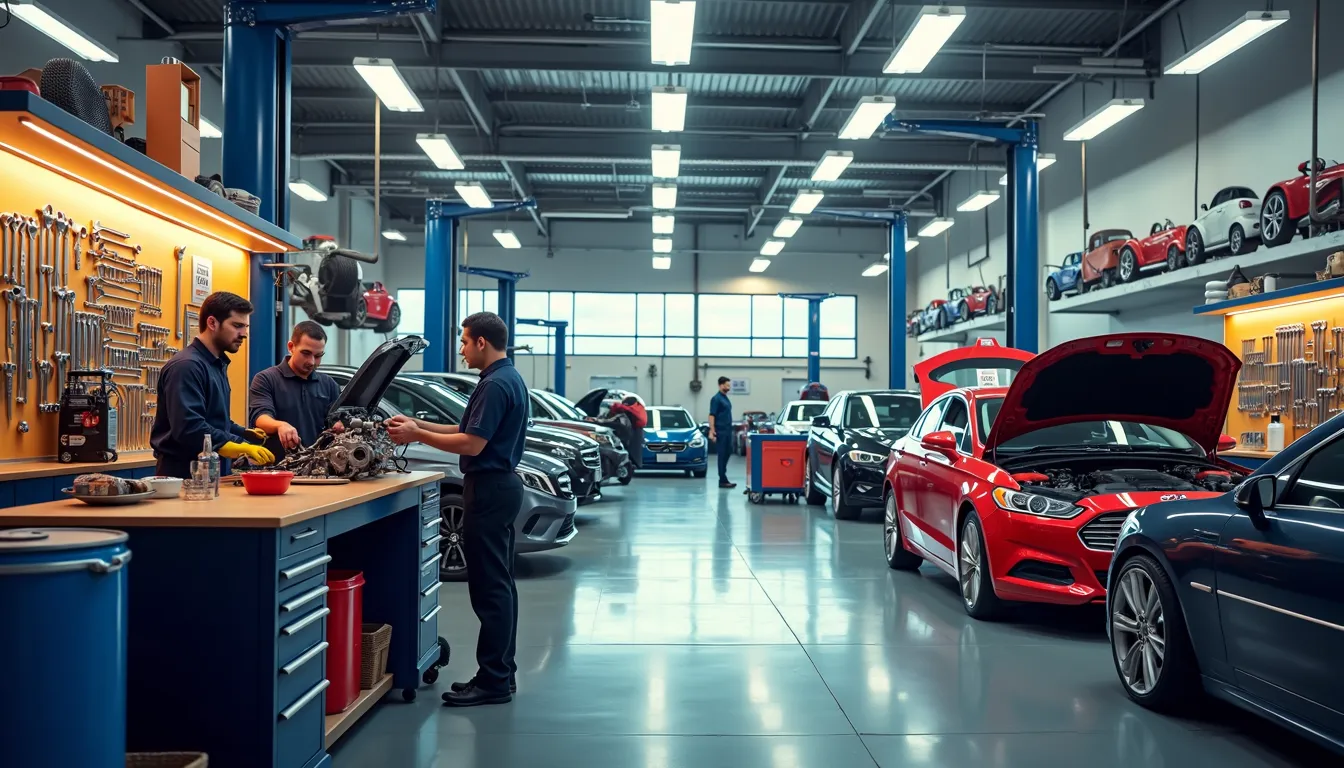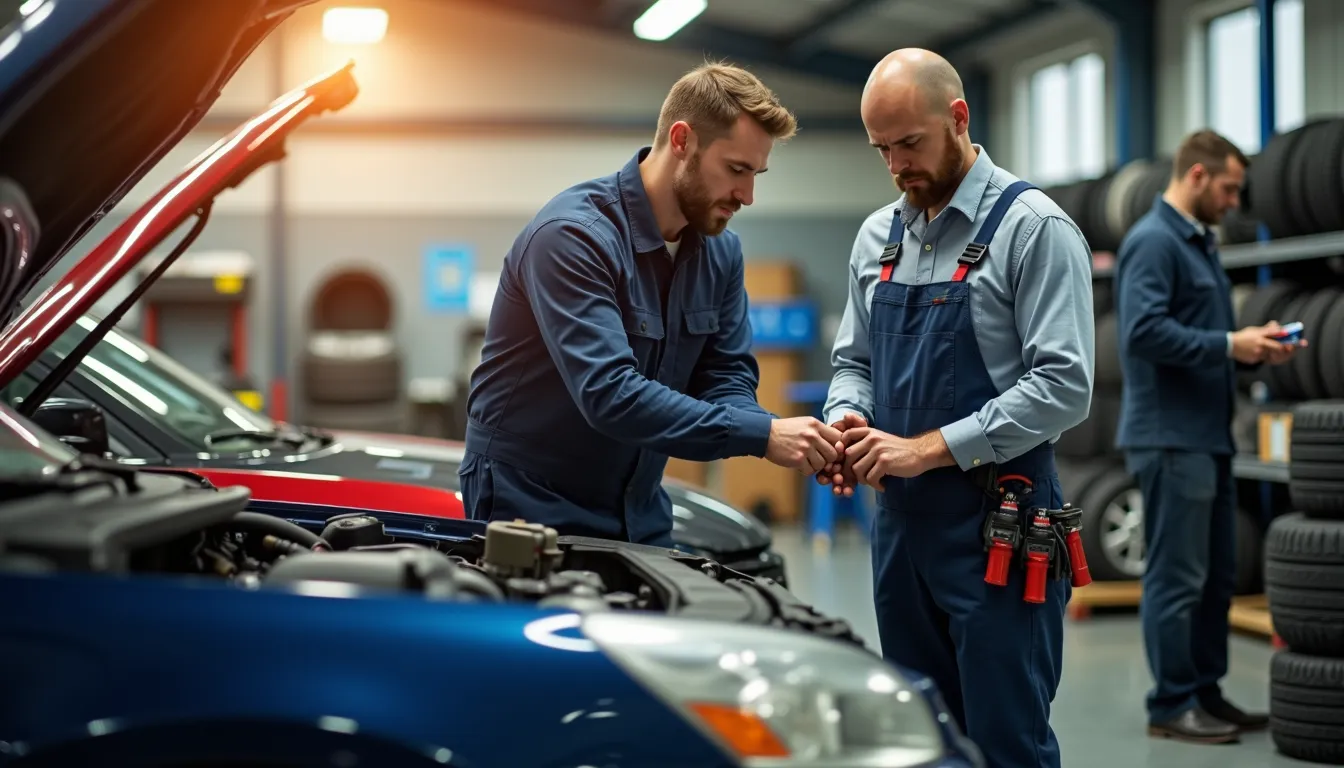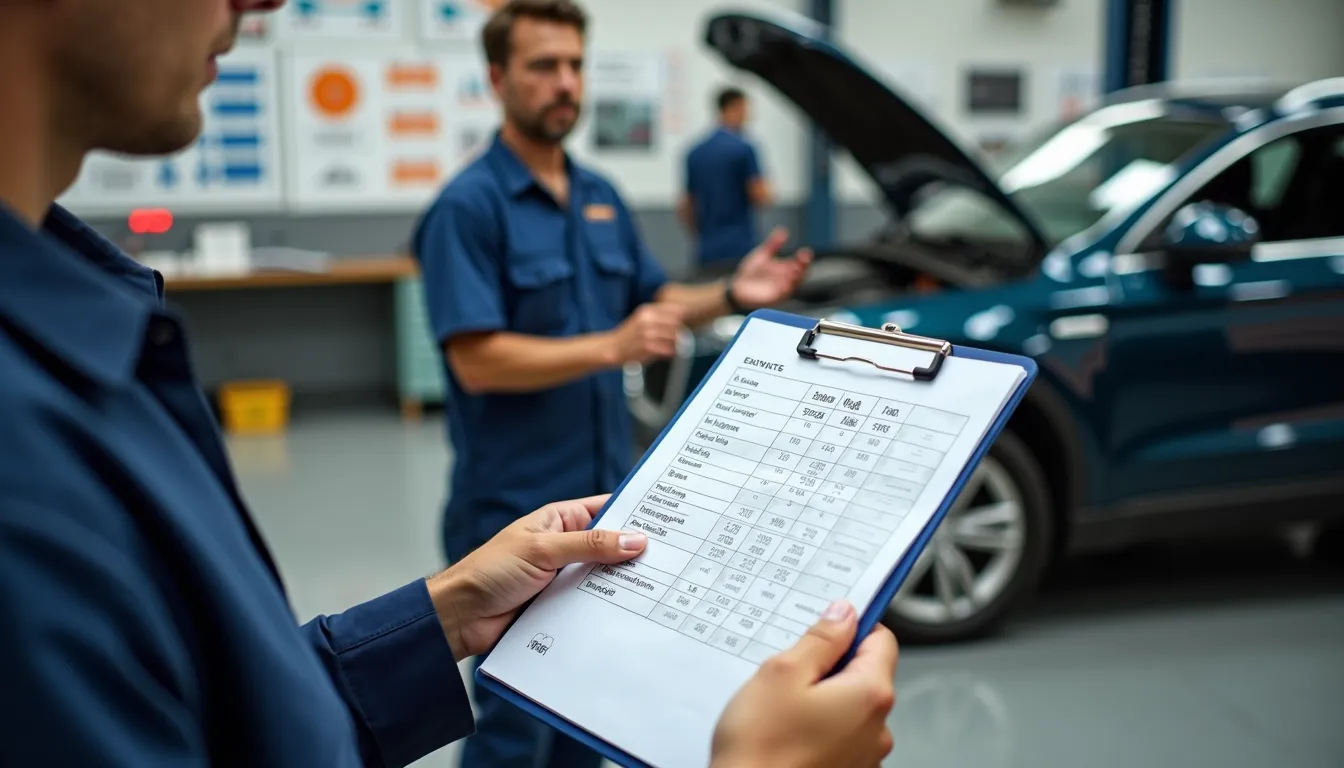4 Essential Guide to Choosing Auto Repair Shops Wisely

When it comes to auto repair shops, finding a reliable one is crucial. Whether your car needs a simple oil change or major repairs, you want to make sure you choose the right service. This guide will help you understand the world of auto repair. You’ll learn what to look for in a shop, how to keep your costs in check, and why proper maintenance matters.
Key Takeaways
- Choose wisely: Look for trust and good reviews when picking an auto repair shop.
- Know your costs: Understanding overhead costs helps you get fair pricing.
- Regular maintenance: Keeping up with your car’s needs can save money in the long run.
- Avoid surprises: Clear communication with your mechanic helps prevent unexpected bills.
For more information on how to maintain your vehicle effectively, check out our comprehensive guide on essential vehicle maintenance practices.
What Is an Auto Repair Shop?

An auto repair shop is where you take your vehicle for maintenance and repairs. These shops fix a wide range of issues, from brakes to engines. They can be small family-owned businesses or larger chains. Your experience may vary based on the shop you choose.
Types of Services Offered
Auto repair shops offer many different services. Here are some common ones:
| Service Type | Description | Frequency |
|---|---|---|
| Oil changes | Replacing old oil with new oil for engine health. | Every 3,000 to 5,000 miles |
| Tire rotation | Changing the position of tires to ensure even wear. | Every 5,000 to 7,500 miles |
| Brake services | Checking and replacing brake pads as needed. | Every 10,000 to 20,000 miles |
| Engine repair | Fixing or overhauling engine components as necessary. | As needed based on performance |
When to Go to an Auto Repair Shop

Knowing when to visit a mechanic can save you time and money. Here are some signs that your car may need repairs:
Warning Lights
If your dashboard lights up with warnings, it’s time to visit a shop. Common warning lights include:
- Check Engine: This could mean many things.
- Oil Pressure: Low oil pressure can damage your engine.
- Battery: This indicates issues with your car’s battery or electrical system.
Strange Noises
If your car makes unusual sounds, don’t ignore them. Here are some common noises and what they might mean:
- Squeaking: This may be a sign of worn brake pads.
- Hissing: This could mean a coolant leak.
- Rumbling: If you hear rumbling when you drive, it might be an exhaust issue.
Unusual Smells
Pay attention to any strange smells coming from your car:
- Burning: This can mean overheating or electrical issues.
- Sweet: A sweet smell may indicate a coolant leak.
- Gasoline: Strong gas smells can signal a fuel leak.
How to Choose an Auto Repair Shop

Picking the right auto repair shop is important. Here are some steps to help you choose wisely:
Look for Reviews
Check online reviews to see what others say about the shop. Websites like Yelp and Google can be helpful. Look for:
- Positive feedback: Good reviews can show you that the shop does quality work.
- Negative experiences: Pay attention to complaints about pricing and service.
Ask for Recommendations
Talk to friends and family for recommendations. Word of mouth can help you find trustworthy shops. Ask questions like:
- Where do they go for repairs?
- Have they ever had a bad experience?
Inspect the Shop
If you can, visit the shop before making a decision. Here’s what to look for:
- Cleanliness: A tidy shop shows that the mechanics take pride in their work.
- Equipment: Check if they have modern tools and technology.
- Professionalism: Staff should be friendly and willing to answer your questions.
Understanding Auto Repair Costs

Knowing how to manage your auto repair costs helps keep your budget in check. Here are some key points to consider:
What Are Overhead Costs?
Overhead costs are expenses that keep the shop running. These can include:
- Rent: The cost of the building where the shop is located.
- Utilities: Bills for electricity, water, and heating.
- Labor: Wages paid to mechanics and staff.
Understanding these costs can help you know why prices may vary between shops.
How to Get Fair Pricing
Getting a fair price for repairs is essential. Here are some tips:
- Get multiple quotes: Don’t settle for the first price. Ask several shops for estimates.
- Ask for a breakdown: Understand what is included in the estimate. This helps avoid surprises.
- Inquire about warranties: Many shops offer warranties on their work. This can save you money if something goes wrong.
Here are some factors that can influence auto repair costs:
- Type of repair: More complex repairs generally cost more.
- Location: Labor rates can vary significantly by region.
- Shop reputation: Well-known shops may charge premium prices due to their reputation.
The Importance of Regular Maintenance

Regular maintenance is vital for your vehicle’s health. Here’s why you should stay on top of it:
Prevents Major Issues
When you keep up with maintenance, you can spot problems before they become expensive repairs. Here are some common maintenance tasks:
- Oil changes: Changing oil regularly helps your engine last longer.
- Tire checks: Rotating and balancing tires keeps your car safe to drive.
- Fluid checks: Inspecting fluids like brakes and transmission fluid prevents breakdowns.
Saves Money
Regular maintenance often costs less than major repairs. You can avoid unexpected expenses by taking care of your car. Consider this:
- A small repair today can save you from spending a lot later.
- Well-maintained cars also get better fuel efficiency, saving you money at the pump.
Communicating with Your Mechanic

Good communication with your mechanic is key. Here’s how to make sure you and your mechanic are on the same page:
Be Clear About Issues
When you take your car in, explain the issues clearly. Use simple language and describe:
- Symptoms: What does the car do or not do?
- When it happens: Does it happen when you accelerate, brake, or drive at certain speeds?
Ask Questions
Don’t be afraid to ask questions about repairs. This can help you understand what’s needed and why. Some questions might include:
- What caused the problem?
- How urgent is the repair?
- What are my options?
Stay Informed
Make sure to stay informed throughout the repair process. Ask for updates and don’t hesitate to request a detailed invoice when your repairs are done.
Common Myths About Auto Repair Shops

There are many myths floating around about auto repair shops. Here are a few to clear up:
Myth: All Auto Repair Shops Are the Same
Not all shops are created equal. Some specialize in certain types of repairs, while others may be generalists. Researching your options is important.
Myth: You Must Go to the Dealer for Repairs
While dealers may be good for certain types of repairs, many auto repair shops are just as qualified. Independent shops can often save you money.
Myth: Maintenance Is Not Necessary
Some people think they can skip maintenance. This is a big mistake. Regular maintenance keeps your car running well and can prevent high repair costs down the road.
The Future of Auto Repair Shops

The auto repair industry is changing. Here are some trends to watch for:
Technology Advancements
As cars become smarter, auto repair shops must adapt. Many shops now use advanced diagnostic tools. These tools help mechanics understand what’s wrong quickly and accurately.
Eco-Friendly Practices
More shops are focusing on green practices. This means using recycled parts and eco-friendly fluids. This trend is good for the environment and can attract more customers.
Increased Transparency
Customers want to know more about what they are paying for. Many shops are starting to offer detailed invoices and online pricing. This helps build trust between customers and mechanics.
For additional insights into the cost of repairs and what factors you should consider, visit our page on repair cost breakdowns.
Conclusion
Finding a good auto repair shop is important for your car’s health and your wallet. By keeping up with maintenance and understanding costs, you can make smart choices. Be sure to communicate well with your mechanic and don’t fall for common myths. With the right information, you can keep your vehicle running smoothly and stay within your budget.
Remember, your car is an investment. Taking care of it through regular maintenance and finding a trustworthy shop can lead to a reliable and safe driving experience.
| Maintenance Task | Recommended Frequency | Benefits |
|---|---|---|
| Oil Change | Every 3,000 to 5,000 miles | Extends engine life |
| Brake Inspection | Every 10,000 miles | Enhances safety |
| Tire Rotation | Every 5,000 to 7,500 miles | Improves tire longevity |
| Fluid Checks | Monthly | Prevents unexpected breakdowns |

Leave a Reply